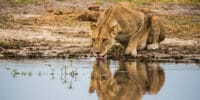Controversial Oil Drilling in Kavango Basin
Community leaders and conservationists are concerned about oil exploration in the Kavango Basin region of Namibia and Botswana. They believe the exploration and potential production lines pose a threat to water resources and therefore the local people and wildlife.
Drilling licenses approved
The company that has the license to carry out the exploration is called ReconAfrica. The area that they will be drilling spans 13,600 sq miles across the 2 countries. They are speculating that lots of oil may be present.
The Namibian Government has approved the license for test wells within their part of the region. The wells will descend roughly one and a half miles deep in order to determine the presence of oil. That work was due to start at the beginning of 2021. If oil is found then hundreds of wells will be put in across a large area and there is the possibility that the controversial process of fracking will be used.
Ecological threat
The ecological threat is to the local diverse ecosystem. Over 200,000 people live in the area, but also the test sites overlap with an enormous area of conservation land. Angola, Botswana, Namibia, Zambia and Zimbabwe have created a multi country conservation area. It is the largest conservation area in Africa. ReconAfrica’s licensed test area overlaps this huge international park. This land includes 6 locally managed wildlife reserves, a Unesco World Heritage site (Tsolido Hills in Botswana) and the Okavango Delta that lies to the south east of the licensed drilling area.
WWF fear that the infrastructure that goes towards exploring for oil is a worry, regardless of what they find. The required roads, buildings and pipelines will impact local wildlife. If the exploration proves successful and fracking is used as a means to retrieve what is found then that is a further concern. Fracking has been known to cause localised earthquakes and can pollute water. However it has not yet been confirmed that fracking would be used.
ReconAfrica has said they will ensure no environmental impact will come from the wells. However, many are surprised by the Kavango Basin license being granted. Those making a living from wildlife tours in the region fear the exploratory wells could destroy their livelihood. On the flip side, the Namibian Ministry of Mining and Energy has said in a press release that drilling will provide work to locals. The Namibian government has a 10% stake in RecoAfrica oil development but it is not sure what that will amount to.
Use of water an issue
There is fear that the test sites will require huge amounts of water. The source of the water according to ReconAfrica is the Omatako River that largely flows underground. However, how will its use affect the local communities that also use that water source? There is also a risk around the disposal of waste water from the test wells. The river is of ecological importance as both animals and people rely on it.
Namibia is not blessed with being able to be agriculturally self sufficient. However farms within the licensed drilling zone do produce some of Namibia’s food. There are about 600 farms in the region all relying on locally sourced water to irrigate their crops. If their irrigation is affected and they lose their crops then Namibia will have a greater food shortage issue than it already has.
Wild Dog habitat threatened
ReconAfrica has done environmental impact assessment and their report states that they believe the impact on flora and fauna in the drilling area will be negligible. The Kavango Basin in their estimation is not a ‘sensitive area’ and all activity will be localised. However, wildlife groups disagree.
The African Wild Dog Working Group say that there are more wild dogs around the licensed drill region than anywhere else in the world. Wild dogs are extremely sensitive to habitat change, and it seems likely that there would be some habitat impact with drilling in the area. The required infrastructure alone would upset the delicate balance.
Numerous potential impacts
There are numerous ways that the test sites could impact the area. An influx of oil workers increases the demand for food, which may in turn increase illegal poaching, and high value game poaching. Noise is also an issue. In central Africa there are reports of elephants becoming nocturnal due to oil exploration noise during the day.
With many ways in which the local communities and wildlife could be negatively affected it seems that ReconAfrica have an enormous task to make good on their assessment that the drilling impact will be ‘negligible’.


